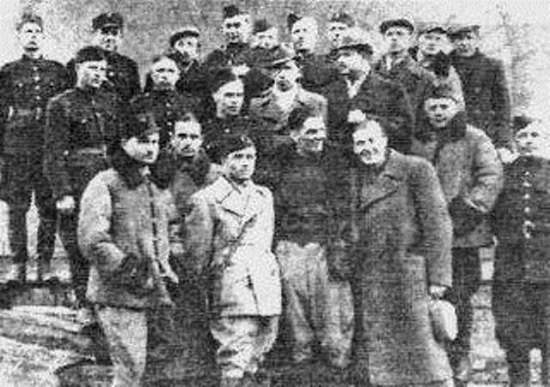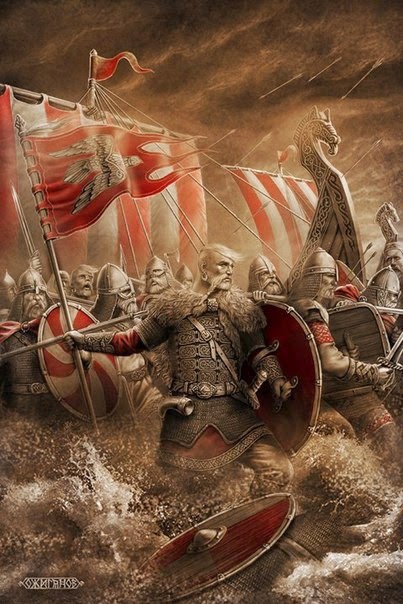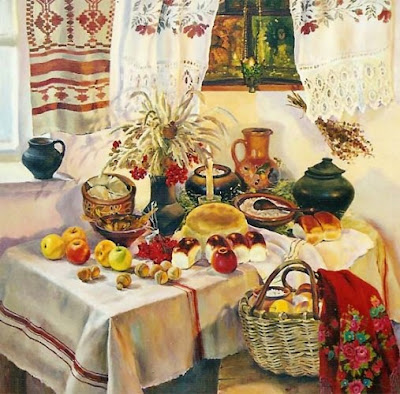UKRAINIANS AND THE HERITAGE OF WORLD WAR II, PT 2: "POPPY FLOWER AND MAY 8"
In attempt to refuse the Soviet heritage and ideological symbols of the epoch few years ago the Ukrainian authorities decided to refuse the Kremlin concept of the 9th May's "Victory Day" and orange-black ribbon (St. George's ribbon) as its symbol. However, it is clear, that modern Ukrainian elites did the same mistake once again when they decide to replace the Soviet concept by the Western (the 8th May's Day of Remembrance and the poppy flower symbol) instead of advocate Ukraine's multifaceted position on the World War II.
Let's examine the issue in a number of points:
Let's examine the issue in a number of points:
I. First of all, we have clearly distinguish the history of a particular family and national history. Worth note, that the author's great grandfather was awarded the Order of Cavalier of St. George Cross (the highest award in the Russian Empire) for taking part in one of the most difficult battles on the Eastern Front during the First World War - siege of the fortress of Osovets. And the author is sincerely proud of the feats of his ancestor, moreover, that is a part of the family history, what he will proudly tell to his descendants. However, considering the World War I from the perspective of national history we have sincerely admit, that Ukrainian military formations of the Austro-Hungarian Empire, such as Ukrainian Sich Riflemen had the clear vision of Ukrainian independence and desire to fight for national independence. And therefore they had been acting to the benefit of the nation in its historical dimension of being. Everyone, every particular family has the right to honor the memory of their ancestors regardless of which uniforms they wore in a particular war. Moreover, there are special days in our culture, when, according to the Christian tradition we commemorate our ancestors. But at the state level first of all we have to commemorate those political and military formations, which were founded by Ukrainians and based on the nation-liberation ideas, and which soldiers and officers had wore chevrons with Ukrainian coat of arms.
II. In its essence both the Soviet cult of the "Great Victory" and its modern mutation of the 8th of May have one and the same goal - to impose on Ukrainian people such an interpretation of the WII history, according to which our grandparents didn't fought for the freedom of their land, and, respectively, we don't have a right to rule here. However, if the Kremlin's ideology of the "Victory Day" is based on the assertion that "all we are - Ukrainians, Belarusians, Tatars, Russians, Uzbeks, Jews, Kazakhs, etc were united as a Soviet People, we have defeated 'fascism' and now we must back to our common socialist cowshed in the name of our 'great' joint past," then the 8th May's Day of Remembrance is based on the concept that "Ukrainians' main goal in the WWII was hostile struggle with horrible nazis, who were willing to kill everyone and destroy everything, and now we have to be tolerant to every our enemy in the name of democracy, we have to legalize same-sex marriages and let few millions of migrants in, and everyone, who doesn't likes this idea is a nazi, he don't respects the exploit of the veterans, etc."
III. Growth historical discourse on "Ukrainians, who had fought on the side of the United Nations in the WWII" shortly before the beginning of May is another interesting issue, that has to be mentioned here. First of all should note, that there is no reason to be proud about the fact, that our countrymen were used by the socialist Kremlin and the capitalist West in their attempt to divide Europe. We also have to remember, that the United Nations didn't support Ukraine in its anti-Bolshevik struggle in 1917-1920; Churchill didn't raised the issue of artificial famine in Ukraine initiated by Moscow; at the same time Vidkun Kvinslinh was the first and the only European politican, who drew global attention to the genocide of Ukrainians. The European politicians had ignored the fact, that the Ukrainian youth had no right for higher education in the Polish republic (when Galicia was occupied by Poland with support of French forces) in interwar period; same as they had ignored the fact of mass destruction of Orthodox churches by Poles in 1938-1939; there was noone on our side, when the Polish government launched the genocide and eviction of Ukrainians from Zakerzonia region as well as during the Visla operation. Why do we have to be grateful?
IV. It should be noted, that in on the Allies side we can see clear domination of two different and at the same time very similar cosmopolitan ideologies of socialist Moscow and capitalist West, that, in contrary, there was a flourishing diversity of interesting and original ideological concepts on the side of the Axis Powers: Mussolini's Fascist Italy, National-Socialist Germany, Catholic-conservative Spain and Portugal, politically inexpressive Hungary (in fact, nationalist forces came to the power there only in 1945, just before the end), National-Catholic Croatia and Slovenia, Orthodox-Monarchist Bulgaria and Romania, Shintoist-conservative Japan, Social-Catholics Degrelle in Belgium and Petten in France, allies movements of Arab nationalists led by the Mufti of Jerusalem and Hindu nationalists. Undoubtedly, all these countries - members of the Axis alliance had many ideological, religious differences, some of them were populated by historically hostile to each other nations, however, all they were united around the desire to live in their own land and in accordance to their own cultural order. Note, that the aforementioned diversity of political and ideological concepts had been reduced to two clearly materialist concepts after the 9th of May 1945, and after few decades - to one joint liberal-capitalist paradigm based on secularism, multiculturalism and the domination of money (both in the western Europe and post-socilaist countries, and especially in modern Russia despite all the Kremlin's propaganda); and any freethinking person is considered as dangerous to the ruling system and immediately charged in "fascism."
V. The theme of prominent personalities of Ukrainian history, who were participated the WWII on the side of the Axis Powers continue to be "uncomfortable" for modern tolerant historians, same as it was for the Soviet history. However they can't ignore such prominent Ukrainian writers as Yuri Horlis-Gorsky (an author of the novel "Cold Yar" and an officer of the UNR army) and Ulas Samchuk, former commander of the legendary Back Zaporozhians (the Zaporozhian Cossack divission in the UNR army) Petro Dyachenko and other participants of the Ukrainian war of 20's - the UNR Generals Pavlo Shandruck and Michailo Omelyanovich-Pavlenko; they can't ignore artist and officer Leonid Perfetsky, last General of the Kuban Cossack forces Vyacheslav Naumenko, founder of the Free Cossacks Ivan Poltavets-Ostranitsa, as well as the hero of the Battle of Kruty Avrekiy Goncharenko and many others. All these people certainly deserve for respect and honor in independent Ukraine. Yes, they had deliberately fought against the "Allies," against the "great anti-fascist" Stalin and against the presence of Hollywood, McDonald's and American banks and the Kremlin agents in Europe. At the same time it is difficult to doubt that the people, who had took arms up in attempt to defend the concept of Europe for its indigenous people, were guided first of all by the idea of free Ukraine.
III. Growth historical discourse on "Ukrainians, who had fought on the side of the United Nations in the WWII" shortly before the beginning of May is another interesting issue, that has to be mentioned here. First of all should note, that there is no reason to be proud about the fact, that our countrymen were used by the socialist Kremlin and the capitalist West in their attempt to divide Europe. We also have to remember, that the United Nations didn't support Ukraine in its anti-Bolshevik struggle in 1917-1920; Churchill didn't raised the issue of artificial famine in Ukraine initiated by Moscow; at the same time Vidkun Kvinslinh was the first and the only European politican, who drew global attention to the genocide of Ukrainians. The European politicians had ignored the fact, that the Ukrainian youth had no right for higher education in the Polish republic (when Galicia was occupied by Poland with support of French forces) in interwar period; same as they had ignored the fact of mass destruction of Orthodox churches by Poles in 1938-1939; there was noone on our side, when the Polish government launched the genocide and eviction of Ukrainians from Zakerzonia region as well as during the Visla operation. Why do we have to be grateful?
IV. It should be noted, that in on the Allies side we can see clear domination of two different and at the same time very similar cosmopolitan ideologies of socialist Moscow and capitalist West, that, in contrary, there was a flourishing diversity of interesting and original ideological concepts on the side of the Axis Powers: Mussolini's Fascist Italy, National-Socialist Germany, Catholic-conservative Spain and Portugal, politically inexpressive Hungary (in fact, nationalist forces came to the power there only in 1945, just before the end), National-Catholic Croatia and Slovenia, Orthodox-Monarchist Bulgaria and Romania, Shintoist-conservative Japan, Social-Catholics Degrelle in Belgium and Petten in France, allies movements of Arab nationalists led by the Mufti of Jerusalem and Hindu nationalists. Undoubtedly, all these countries - members of the Axis alliance had many ideological, religious differences, some of them were populated by historically hostile to each other nations, however, all they were united around the desire to live in their own land and in accordance to their own cultural order. Note, that the aforementioned diversity of political and ideological concepts had been reduced to two clearly materialist concepts after the 9th of May 1945, and after few decades - to one joint liberal-capitalist paradigm based on secularism, multiculturalism and the domination of money (both in the western Europe and post-socilaist countries, and especially in modern Russia despite all the Kremlin's propaganda); and any freethinking person is considered as dangerous to the ruling system and immediately charged in "fascism."
V. The theme of prominent personalities of Ukrainian history, who were participated the WWII on the side of the Axis Powers continue to be "uncomfortable" for modern tolerant historians, same as it was for the Soviet history. However they can't ignore such prominent Ukrainian writers as Yuri Horlis-Gorsky (an author of the novel "Cold Yar" and an officer of the UNR army) and Ulas Samchuk, former commander of the legendary Back Zaporozhians (the Zaporozhian Cossack divission in the UNR army) Petro Dyachenko and other participants of the Ukrainian war of 20's - the UNR Generals Pavlo Shandruck and Michailo Omelyanovich-Pavlenko; they can't ignore artist and officer Leonid Perfetsky, last General of the Kuban Cossack forces Vyacheslav Naumenko, founder of the Free Cossacks Ivan Poltavets-Ostranitsa, as well as the hero of the Battle of Kruty Avrekiy Goncharenko and many others. All these people certainly deserve for respect and honor in independent Ukraine. Yes, they had deliberately fought against the "Allies," against the "great anti-fascist" Stalin and against the presence of Hollywood, McDonald's and American banks and the Kremlin agents in Europe. At the same time it is difficult to doubt that the people, who had took arms up in attempt to defend the concept of Europe for its indigenous people, were guided first of all by the idea of free Ukraine.
Original by Zentropa Ukraine






Коментарі
Дописати коментар